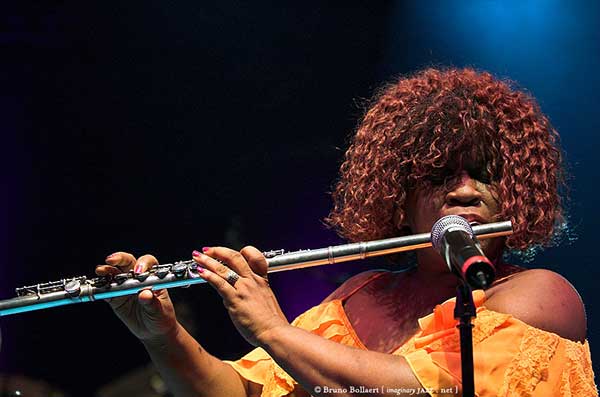10 Reasons Why the Best Sax Players Play Flute

By now, many of you have noticed that many saxophone players also play the flute, which is commonly referred to as a “double” in our world. Often, saxophone parts, particularly in big bands, include segments written for the flute, giving composers and arrangers an added color to work with. And in the studio and show world, it’s almost always a requirement, along with the the clarinet family as well, which is also referred to as a double.
However, there are a number of reasons why I think being able to play the flute can be beneficial for any saxophone player at any level, even if you never intend to play in a big band or pit orchestra for a show.
Here are ten of them:
1) The flute does not require a reed.
This is perhaps my absolute favorite thing about the flute. All the common headaches with finding and maintaining good reeds don’t exist with the flute, which is a beautiful thing. Like many of us who struggle to find practice time in the day, I often find myself with just a short ten or fifteen minute window to practice, and the idea of finding a good reed and prepping it, getting it to really vibrate, and then storing it once I’m done is quite unappealing, to say the least. No need for any of this with the flute! It plays right out of the box, as they say…
2) It has almost the exact same register as the saxophone, and fingerings are almost identical.
The lowest note on the flute is a low C below the staff (of low B if you have a B-foot on your flute), and the flute goes up three octaves from there. This is almost identical to the saxophone range (including some high notes above F# that would be considered altissimo for the saxophone). This makes most saxophone music playable on flute, and vice versa. And just about anything technical that is tripping you up on the saxophone can thus be practiced effectively on flute.
3) It’s pitched in concert key.
Unlike the saxophone, which is a transposing instrument, the flute plays in concert key, so if you are still getting your transposing chops together on saxophone, flute can be very useful for playing music with other people if you don’t have transposed parts.
4) It will do wonders for your breathing and control of your breath.
Because it doesn’t rely on a reed to make the sound, the flute requires an incredible amount of control and finesse with your breath. In fact, from my experiences, advanced flute players typically know more about the mechanics of breathing than any other wind players. Any deficiencies in your breath that might be covered up by your saxophone playing will definitely be apparent with the flute, and improving these deficiencies will do wonders for your saxophone playing.
5) It travels well.
The flute is a great travel partner. It’s lightweight, and you can always put it in a carry-on bag and never worry about having to check it in when you fly. And since it’s a quieter instrument than the saxophone, it’s great for practicing in hotel rooms, or even airport lounges! And if you have pesky neighbors or family members at home who are tired of hearing the saxophone, flute might be much easier on their eardrums.
6) It can be helpful if you’ve taken some time away from playing and are building your embouchure back up.
If you’ve ever taken some time away from playing saxophone before, you know that coming back to playing can be hazardous to your lips, since you lose the callous that protects them within a few days of not playing. Since there’s no pressure whatsoever from the teeth with the flute, this isn’t an issue, so you can play away, even if you’re out of shape.
7) Since the flute doesn’t have a register key, it can help you with your voicing.
The flute has the same overtone series as the saxophone, so you can do almost all of the same overtone exercises on it, and because there is no register key, it forces you to voice notes much more precisely than you might do for the saxophone.
8) It will give your body a nice break if you’re doing heavy saxophone practicing.
Most of us who do a lot of practicing start to experience strain on some part of our body. While there are many things you can do to alleviate this, such as using a harness, doing yoga or learning Alexander Technique, one of the best things you can do is to vary what you do with your body so you’re not always in one position. Since the position of playing the flute is so radically different than playing the saxophone, it can help your body to loosen things up if you are experiencing fatigue or tension anywhere.
9) It’s the oldest instrument around, so there’s much more music written for it.
Unlike the saxophone, which is considered a baby in our musical world at just 150 years old, the flute has been around since cavemen roamed the earth, so since the dawn of notated music in the 17th century, there’s been music for flute. And unlike the saxophone, which rarely makes an appearance in the orchestra, the flute is a core part of the orchestra, so there’s much more opportunity to play it in that setting. And just to be able to play that amazing Bach partita alone…
10) There are some AMAZING jazz and Latin music flutists to listen to.
Expand your ears! Go here for a list of a hundred of the best jazz flutists, and for Latin flutists, try Maraca Valle, Dave Valentin, José Fajardo, Richard Egues, or Johnny Pacheco.
So if you don’t have one, go pick up a flute, find a good teacher, and play away. And if you already have a flute, hopefully some of these ideas will make your flute playing much more rewarding of an experience.
And one more bit of inspiration I’ll leave you with while I’m at it…
(actual flute in this clip performed by Katisse Buckingham)
And as always, I welcome your thoughts in the comment section below.
Learn with and Listen to Sam
Sam Sadigursky is currently offering online lessons through Skype and private lessons in NYC. He has given improvisation clinics across the U.S., is a regular guest professor at Hunter College, and currently performs internationally with Darcy James Argue’s Secret Society, Folklore Urbano, and others. His new book, 12 INTERVALLIC ETUDES for Saxophone, is available here. His albums can be purchased at http://samsadigursky.bandcamp.com. To find out more, visit SamSadigursky.com.






July 16, 2015 @ 3:23 pm
I’m not a saxophonist anymore, but when I use to play my favorite flutist were sax players. Yusef Lateef, Rashan Roland Krik, Eric Dolphy and Frank Wess are a few that I listened to a lot. They all made the flute a solo instrument that transcended the instrument and in the case of Lateef, Kirk and Dolphy I would say they were major innovators of the flute.
June 6, 2016 @ 4:49 pm
A great doubler is Harold McNair. jazz/folk/world music and calypso!
July 17, 2015 @ 9:11 am
I play shakuhachi, even cooler.
August 6, 2015 @ 12:12 pm
Because I no longer have feeling in my right hand I can no longer play the clarinet because I cannot feel the keys and thus I cannot cover the tone holes correctly. So I decided that now is the time to learn the closed hole flute. All the points made above are correct especially number 4. It is much harder to slur a phrase on flute than it is on my tenor sax. Actually it is much easier for me to slur phrases, intervals etc on tenor than it is on flute.
Flute takes a lot more breath control than sax, clar, bass clar etc. But I am sticking with it because I am starting to get it, If I ever get my feeling back in my right hand I will triple on sax, clarinet and flute. Actually I think the flute is kind of neat. Plus for single guys it’s a good way to meet girls.
September 14, 2015 @ 2:56 pm
no register key ?
the best point is # 10
whole article not quite high level and sophisticated
the flute is a great instrument [the artistic reasons why saxist double on flute not broached by article]
September 24, 2015 @ 2:56 am
Hi BSWE, now I feel I need to play the flute after reading your article about. the 10 reasons to play one! I actually only play soprano sax in a quartet practising Christmas Carols in fairly easy arrangements. I only started January after struggling with the break on the clarinet. But my wife may kill me if I buy a flute! As a matter of interest I am in Turkey at this moment and have just bought a Mey, which has fingering similar to the chanter of the bagpipes but with those quarter notes which makes the interesting Turkish sound and not too difficult to get sounds from…I also have a Ney which is like a long piece of bamboo with a circular mouthpiece off the net which is the Turkish flute! I have been for a lesson here in Turkey and have almost got a note,they say it takes about 3 months to get going! Hopefully if I get a flute it won’t be quite so difficult? Thanks for a great website very informative and stimulating but if she kills me if she notices a flute amongst all my other instruments you will to be blame. Seriously though thanks again for all your info’ . Kindest regards Brian Bushell :)
ents
arrangem
June 29, 2016 @ 3:47 am
what kind of flute do you advise?
thank you
August 17, 2016 @ 12:34 am
I feel the easiest is the closed hole/plateau models. If you want to “up your game” go for at least a silver headjoint. If money isn’t tight go for the full silver tube. If you have a sense of adventure go for the open hole start with the plugs in then take them out as you become accustomed to covering the holes. There are many options. My first flute was a student model that I got from a garage sale.
August 16, 2016 @ 10:31 pm
You need about 15 years to master with 3 to 5 hours a day of intense practice . But like they say discipline makes fredom!
October 29, 2016 @ 3:09 pm
I need help… would a flute and a Baritone sax be a good combination for a duet???
October 29, 2016 @ 3:11 pm
P.s i play flute
October 30, 2016 @ 7:37 pm
i play clarinet 1 chair and was invited to one of the best msrching bands in NC for 8 grade but i want to start doing alto sax exploration what do i do with tone using throat muscles in practice?
February 15, 2017 @ 12:46 am
I played the trumpet, and my daughter played a flute. I always loved sax, and as my neighbour played a clarinet – he always loved to play a saxophone, in the time of sunset :) that was like in the movie!
January 10, 2019 @ 1:11 am
Thanks for the information